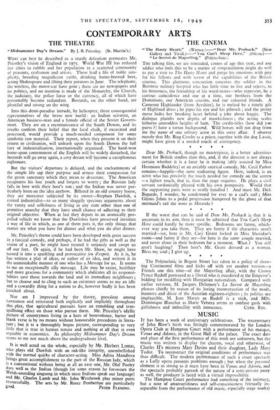CONTEMPORARY ARTS
THE THEATRE.
"Midsummer Day's Dream." By J. B. Priestley. (St. Martin's.)
WHAT can best be described as a sturdy defeatism permeates Mr. Priestley's vision of England in 1975. World War III has reduced her cities to rubble and her population to a scattered community of peasants, craftsmen and artists. These lead a life of noble sim- plicity, breeding magnificent cattle, drinking home-brewed beer, acting Shakespeare and lifting their potatoes in June. The telephone, the wireless, the motor-car have gone ; there are no newspapers and no politics, and no mention is made of the Monarchy, the Church, the judiciary, the police force or the currency, all of which have presumably become redundant. Bustards, on the other hand, are plentiful and strong on the wing.
Into this demi-paradise intrude, by helicopter, three consequential representatives of the brave new world: an Indian scientist, an American business-man and a female official of the Soviet Govern- ment. They are on a reconnaissance of the South Downs, and its results confirm their belief that the local chalk, if excavated and processed, would provide a much-needed component for some synthetic raw material. Their report, when they present it on their return to civilisation, will unleash upon the South Downs the full fury of industrialisation, internationally organised. The hard-won home-spun contentment of the English will be widely disturbed, the bustards will go away again, a cosy dream will become a cacophonous nightmare.
But the visitors' departure is delayed, and the enchantments of the simple life sap their purpose and arouse their compassion for the green sanctuary which they mean to desecrate. The American recaptures his lost youth and forgets to worry ; the Russian lady falls in love with their host's son ; and the Indian was never par- ticularly keen ion the idea anyhow. Billeted in an old country house, they are moreover subjected by its owner—Stephen Dawlish, a retired industrialist—to so many shaggily specious arguments about the vanity and selfishness of living in any state other than one of primitive anarchy that they have small chance of adhering to their original objective. When at last they depart in an atomically pro- pelled vehicle we know that the Dawlishes have preserved inviolate a way of life in which, as one of them puts it, the only things that matter are what you have for dinner and what you do after dinner.
Mr. Priestley's theme could have been developed with great success in a farcical comedy, and perhaps, if he had the gifts as well as the vision of a poet, he might have treated it seriously and swept us off our feet. Or again, if he had been Mr. Shaw, he might have turned it into a sparkling and provocative jeu d'esprit. As it is, he has written a play of ideas, or rather of an idea, and written it in the unmistakable manner of one who has a Message for us. It seems to me an exceptionally silly message. Life may be easier, healthier and more gracious for a community which abdicates all its responsi- bilities save those towards the land and its immediate neighbours ; but to choose and to cling to such an existence seems to me an idle and a cowardly thing for a nation to do, however badly it has been knocked about.
Nor am I impressed by the theory, prevalent among townsmen and reiterated both explicitly and implicitly throughout this play, that agricultural pursuits have an ennobling and tran- quillising effect on those who pursue them. Mr. Priestley's idyllic picture of countrymen living in a haze of benevolence, barter and blank verse is by no means without honourable precedents in litera- ture ; but it is a thoroughly bogus picture, corresponding to very little that is true in human nature and nothing at all that is even arguable in economics. As philosophy Midsummer Day's Dream seems to me not much above the undergraduate level.
It is well acted on the whole, especially by Mr. Herbert Lomas, who plays old Dawlish with an oak-like integrity, unembellished with the normal quirks of character-acting. Miss Adina Mandlova brings great accomplishment to the part of the Russian lady, which is a conventional without being at all an easy one, Mr. Olaf Pooley does well as the Indian (though for some reason he forswears the Welsh-sounding singsong in which most Indians speak our language) and Mr. Charles Lamb and Mr. John Westbrook play minor parts resourcefully. The sets by Mr. Reece Pemberton are particularly


































 Previous page
Previous page